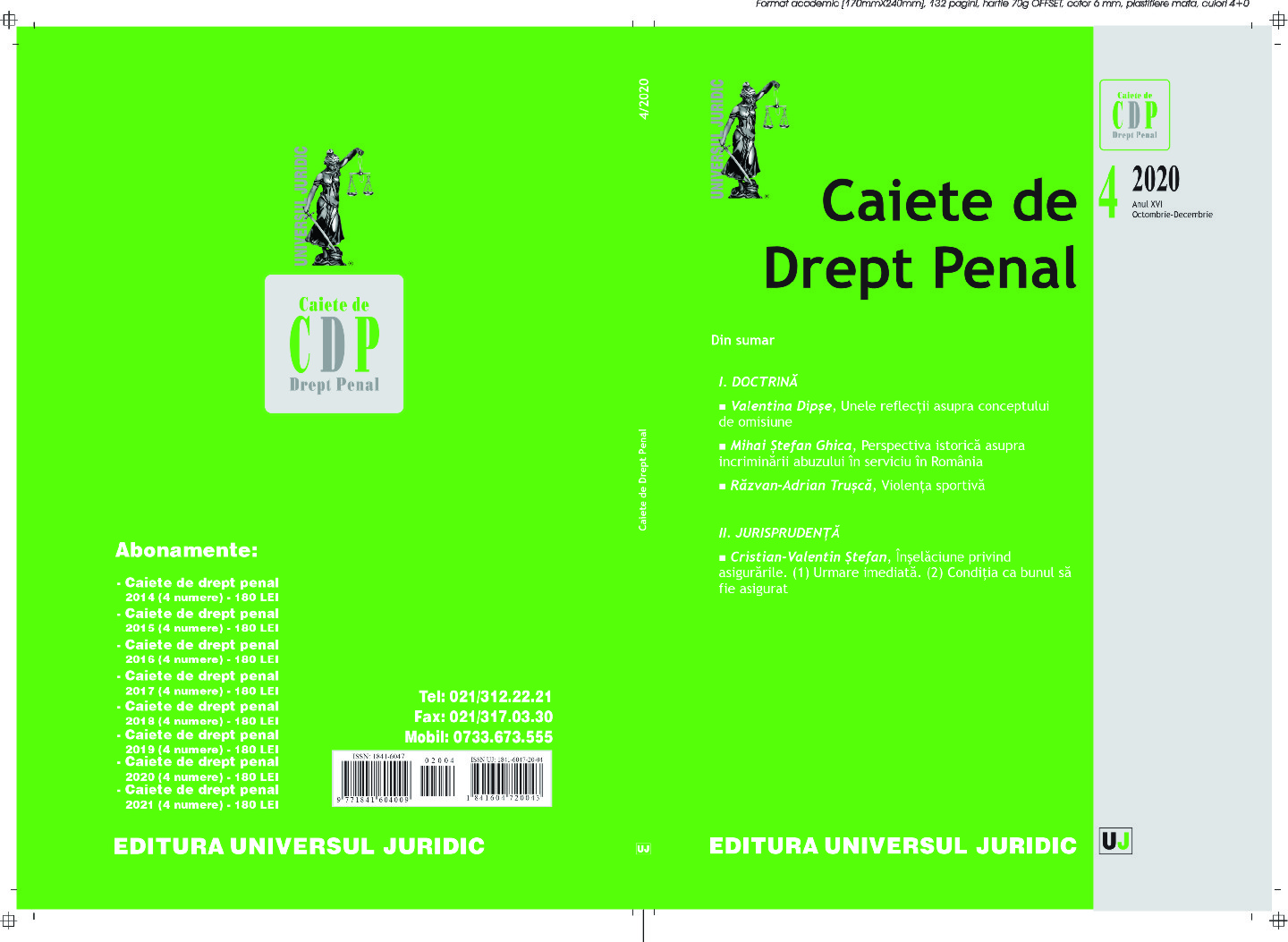Perspectiva istorică asupra incriminării abuzului în serviciu în România
The historical perspective on the incrimination of abuse of office in Romania
Author(s): Mihai Stefan GhicaSubject(s): Law, Constitution, Jurisprudence, Civil Law
Published by: Universul Juridic
Keywords: historical analysis of abuse of office; abuse of power; abuse of authority; unjust taking; subsidiarity of abuse of office; disappearance of express clause of subsidiarity; subsidiary character;
Summary/Abstract: The abuse of office constitutes a crime with a particular problematic specificity, considering the synthetic way of regulation used by the legislator, revealed by the generic terminology used and by the logical-legal structure of the incrimination norm. The most acute difficulties appear in the delimitation of the crime from other forms of legal liability, aspect that belongs to the field of application of the incrimination norm, as well as in the relation with other crimes, in the situation when they have a vocation of concomitant application. It should not be overlooked that criminal law should become incident only when the general interest is so affected that civil, disciplinary or administrative sanction is not sufficient – an aspect arising from the ancillary, discontinuous nature without a specific area of regulation of this branch of law, elements on which the principle of minimum intervention governing this matter is based. Within this framework, the historical analysis becomes relevant for understanding the evolution of the norm of incrimination over time in the positive law that provides the necessary information for: the historical interpretation of the notions that make up the current incrimination; strengthening the perspective on the legal concept of abuse of office as a whole; better application in judicial practice; delimitation from other forms of legal liability. On the other hand, one cannot omit the way in which in different historical stages the reason of the incrimination has changed, as well as its logical-legal structure as a whole and the different constitutive elements. The historical context in which the incrimination evolved from abuse of power to abuse of office in correlation to the contemporary jurisprudence of the different historical stages can contribute to a better perception on the different solutions of judicial practice, namely on their relevance for the application of the current incrimination norm. For this reason, the study allows itself to suggest the interruption of a certain inertia in retaining the significance and further applicability of certain older jurisprudential solutions. The historical perspective is also significant to determine the relationship of abuse of office in the current regulation with other incriminations in the Criminal Code in force and special criminal law, but also with certain administrative deeds whose active subject is the civil servant. For this reason, it is necessary to establish the landmarks in which the explicit subsidiarity clause appeared, as well as those in which it was removed from the incrimination norm. As such, the analysis aims to establish the effects of this reconfiguration, as well as the issue of tacit maintenance of this clause, which in the current literature is treated as a character related to the essence of criminalizing abuse of office. The disappearance of the express subsidiarity clause for redundancy reasons, respectively the evolution in time of the incrimination norm after the removal of the express clause and the preservation of the conceptual essence of the incrimination until now, brings to attention the transformation of the subsidiarity clause from an express one to a tacit one. At the same time, the study draws some landmarks regarding the traditional conceptual confusion between subsidiarity and specialty, highlighting the doctrinal perspective on the concept of subsidiarity that has customarily incorporated, since the late ’50s, the gender-species relationship with other crimes. In the first Criminal Code of the United Principalities of Moldova and Wallachia there was no single incrimination of abuse of office, and the legislator was inspired at that time by Western criminal law, distinctly regulating abuse of power, abuse of authority and, in a fragmented manner, excess of power. The same perspective crystallized under the auspices of the Criminal Code of Carol II, when the excess of power was provided for in a distinct and synthetic norm of regulation. Subsequently, the communist legislator turned to the eastern space, drawing inspiration from Soviet criminal law, a context in which abuse of office was regulated and systematized in three distinct articles. However, the transition to democracy did not mark significant changes in the incrimination of abuse of office, becoming stringent for the legislature only the need for restructuring the legal texts. The study reflects the close link between current forms of abuse of office and criminal offences in communist-era criminal law. Despite the fact that the article does not deal with the special form of the offence contained in Law No. 78/2000, the analysis is also of significance in this case, as long as Article 132 of that normative act is a rule for reference to abuse of office regulated in the Criminal Code. However, the historical interpretation of the criminal rule is not sufficient to fully clarify the issues raised, and must be correlated with the grammatical, teleological and systematic interpretation of criminalisation in the light of the principle of legality and relevant international documents, of human rights case law, and of the principles of resolving the apparent contest of criminal rules.
Journal: Caiete de drept penal
- Issue Year: 2020
- Issue No: 04
- Page Range: 29-76
- Page Count: 48
- Language: Romanian
- Content File-PDF

